Colorectal cancer
What is colorectal cancer?
The rectum is the last inches of the large intestine. It begins at the end of the final segment of the colon and ends in the narrow, short tube that reaches the anus.
Cancer inside the rectum (cancer of the rectum) and cancer within the colon (colon cancer) are often called “colorectal cancer” together.
Although colon cancer and rectal cancer are similar in several aspects, their treatments are quite different. This is mainly because the rectum is located in a narrow place, barely separated from other organs and structures of the pelvic area. Therefore, a complete surgical removal of rectal cancer is difficult and very complex. Additional treatment is often needed pre or post-surgery to reduce the chance that the cancer will come back.
In the past, the long-term survival of people suffering from rectal cancer was not common, even after prolonged treatment. Advances over the last 30 years in treatment, mean that many cases of rectal cancer can now be be cured.
Expert Advice
Our professional mycotherapy specialist advisors can provide tailored advice and mycotherapy protocols using Hifas da Terra organic mushroom products.
Which mushrooms have useful properties for colorectal cancer?
Through the selected fungi we intend a better response to conventional treatment and reduce the associated effects associated with these treatments.
The nutritional deficiencies of the oncological patient are a complex phenomenon, of multifactorial etiology and of important clinical consequences, which have an inseparable relationship with the severity of the disease.
By improving the nutritional status of the patient we improve their immune response and with it the risk of opportunistic infections and side effects.
There are data that justify the use of fungal extracts as a complement in chemotherapy treatments to reduce pain, cachexia and side effects (loss of hair and appetite, vomiting, etc.).
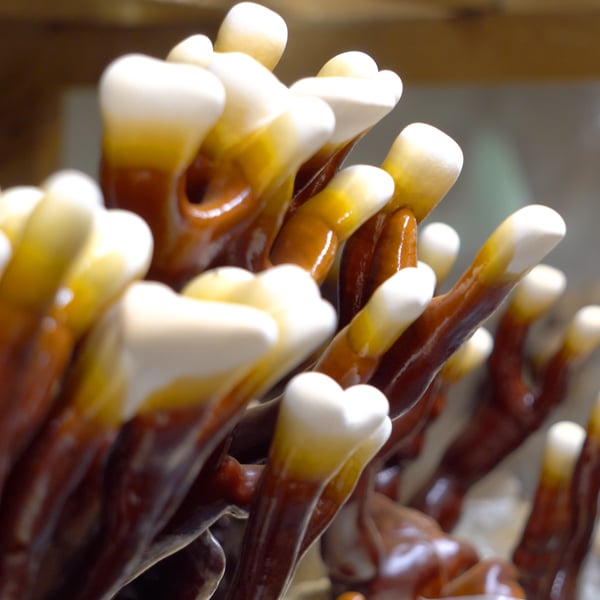
Reishi
Patients treated with Reishi were more likely to respond positively to chemotherapy or radiation therapy compared to those who received only chemo or radiotherapy.
Oncological patients treated with Reishi show a considerable increase in the percentages of lymphocytes, an improvement in the quality of life and a reduction in side effects (nausea and insomnia) compared to the untreated ones.
Reishi contains biologically active compounds against the estrogen-mediated signaling system in tumor cells involved in this type of tumor.
The extract of Reishi has demonstrated sedative and anti-inflammatory capacity, as well as an increase in the total time of sleep, improving the quality of life.
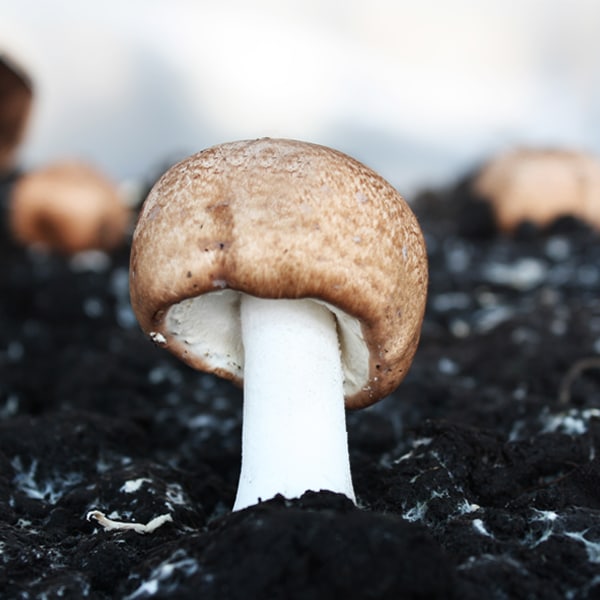
Royal Sun Agaricus
The Mushroom extract of the sun produces improvements in appetite, alopecia, emotional stability and general weakness in gynecological patients undergoing chemotherapy.
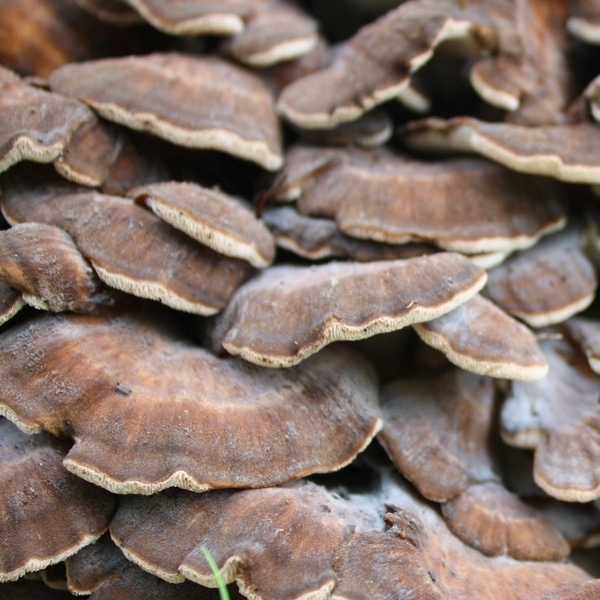
Maitake
The extract of Grifola frondosa is able to produce symptomatic improvements or regression of cancer in 68.8% of patients with breast cancer.
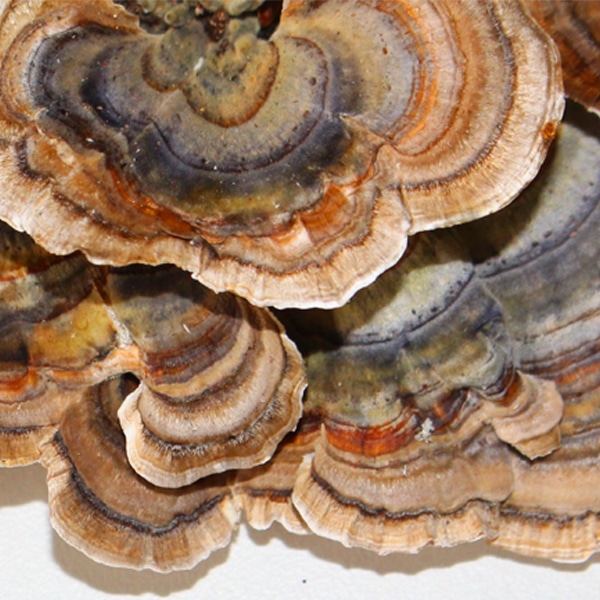
PSK
The extract of Coriolus versicolor (PSK) is able to improve the survival of patients with different types of cancer (mean 9% increase in overall survival and disease-free survival at 5 years) used in combination with chemotherapy against pharmacological treatment isolated.
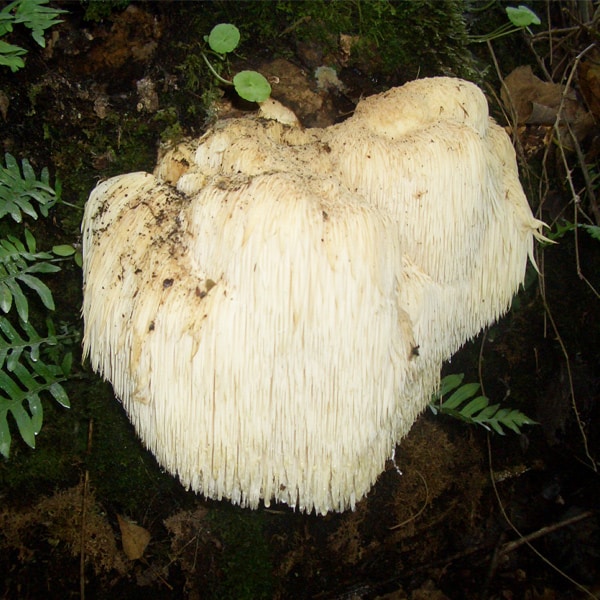
Lion’s mane
Lion’s mane inhibits the growth of gastric, liver and colon cancer cell lines. In addition, it relieves abdominal pain and reduces precancerous cell growth and inflammation in patients with inflammatory bowel disease or chronic gastritis.
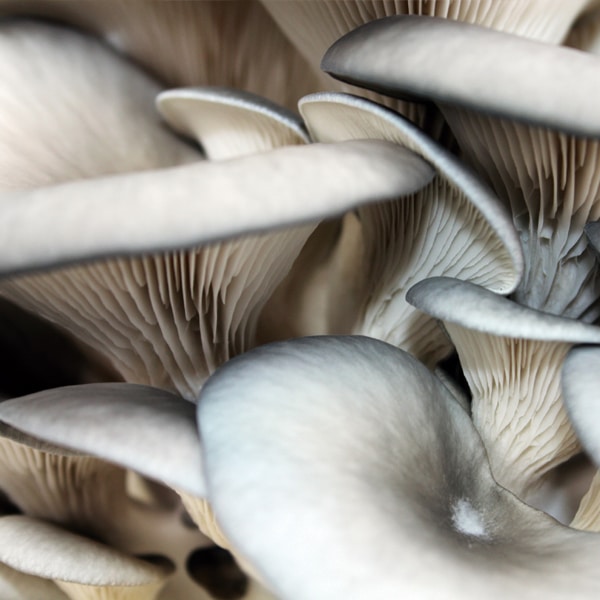
Oyster mushroom
The bioactive polysaccharides present in the Seta of the present antiproliferative activity against gastric and colon cancer cell lines, as well as prebiotic activity.

King Trumpet Mushroom
The series of carts is able to reduce the number of precancerous lesions induced in both the colon and the rectum of animal models. In addition, it presents the prebiotic activity.
Discover the Exclusive Practitioner Area
Free Access to Mycotherapy Resources and Online Support for Health Professionals
Nutrition recommendations and healthy habits
Feeding
ADVISABLE
- Consume plenty of fluids and follow a varied diet rich in vegetables and fruits. This has been associated with a reduction in the risk of this type of cancer due to its content of vitamins and antioxidants. Try to eat the colors of the rainbow, the more varied the colors of your fruits and vegetables, the more complete your diet will be. Avoid refined white flours. Substitute them for organic wholemeal flours that will give you fiber and more nutrients.
- Avoid white sugar or reduce consumption to a minimum. It uses, preferably, natural sweeteners such as cinnamon, stevia or organic honeys.
- Instead of making large meals, it is recommended to make five or six takes a day.
- Drink more than 2 liters of water a day, especially on the days when you receive the treatment. If you get tired of the water, you have infusions to increase your water intake. This will help you in your water balance.
- It is recommended to complete the treatment with an emotional stabilizer that will help you relax and sleep better.
- You can also take nutritional supplements that help protect and promote the activity of your microbiota and avoid constipation associated with treatment.
INADVISABLE
- Very hot foods, fried, spicy, very spicy and flatulent.
- Stimulating and gas drinks.
- Tobacco and alcohol.
- Processed products rich in added sugars, additives and artificial colors such as industrial pastries, sweets, refined cereals, toast, cookies …
- The consumption of trans fats present in processed products such as margarines, fried foods, refined oils …
- Red and processed meat such as sausages, sausages …
- Fast-absorbing carbohydrates that raise blood glucose such as sweets, sugar, fructose, refined flours (white bread, sliced bread, cookies, biscuits …).
Oral hygiene
ADVISABLE
- Make a gentle toothbrush and rinse with water and baking soda after each meal.
- It is recommended to take supplements that help prevent opportunistic infections that generate mucositis.
- Visit the dentist before starting treatment.
INADVISABLE
- Dental extractions and / or any type of dental manipulation (consult your doctor beforehand).
Skin care
ADVISABLE
- Apply moisturizing lotions, to be able to be natural, free of carbomers, DEA, petrochemical derivatives, parabens, synthetic perfumes, phthalates, synthetic dyes and sulfates.
- Protect yourself from solar radiation. Do not expose yourself to the sun between 12 and 6 in the afternoon. Use sunglasses, hats or hats, umbrellas, etc. Use creams of total protection. The lips are a particularly sensitive area, take care and nurture them regularly.
INADVISABLE
- Skin injuries (shaving with razors).
- Direct exposures to the sun.
Hair care
ADVISABLE
- Use a neutral shampoo and combs with thick and separate prongs.
- Wash your hair with warm water, performing gentle friction. Dry it in the air, without using a dryer.
- Use vegetable dyes without ammonia.
INADVISABLE
- Hair dryer with very hot air.
- Recommendations to be taken into account during chemo and radiotherapy treatments.
- Use vegetable dyes without ammonia.
These councils have been developed by the nursing service of the Santa Isabel Clinic and Hifas da Terra.
- Jin X, Ruiz Beguerie J, Sze DMY, Chan GCF. Ganoderma lucidum (Reishi mushroom) for cancer treatment. Cochrane Database of Systematic Reviews 2016, Issue 4. Art. No.: CD007731. DOI: 10.1002/14651858.CD007731.
- Li J, Zou L, Chen W, Zhu B, Shen N, Ke J, et al. (2014) Dietary Mushroom Intake May Reduce the Risk of Breast Cancer: Evidence from a Meta-Analysis of Observational Studies. PLoS ONE 9(4): e93437. https://doi.org/10.1371/journal.pone.0093437.
- Maehara, Y., Tsujitani, S., Saeki, H. et al. Biological mechanism and clinical effect of protein-bound polysaccharide K (KRESTIN(®)): review of development and future perspectives. Surg Today (2012) 42: 8. https://doi.org/10.1007/s00595-011-0075-7.
- Zhao H, Zhang Q, Zhao L, Huang X, Wang J, Kang X. Spore Powder of Ganoderma lucidum Improves Cancer-Related Fatigue in Breast Cancer Patients Undergoing Endocrine Therapy: A Pilot Clinical Trial. Evidence-based Complementary and Alternative Medicine : eCAM. 2012;2012:809614. doi:10.1155/2012/809614.
- Zhang M1, Huang J, Xie X, Holman CD. Dietary intakes of mushrooms and green tea combine to reduce the risk of breast cancer in Chinese women. Int J Cancer. 2009 Mar 15;124(6):1404-8. doi: 10.1002/ijc.24047.
- KOJI OBA, MICHIYA KOBAYASHI, TAKANORI MATSUI, YASUHIRO KODERA and JUNICHI SAKAMOTO. Individual Patient Based Meta-analysis of Lentinan for Unresectable/Recurrent Gastric CanceR. ANTICANCER RESEARCH 29: 2739-2746 (2009).
- Ohwada S, Ikeya T, Yokomori T, Kusaba T, Roppongi T, Takahashi T, Nakamura S, Kakinuma S, Iwazaki S, Ishikawa H, Kawate S, Nakajima T, Morishita Y. Adjuvant immunochemotherapy with oral Tegafur/Uracil plus PSK in patients with stage II or III colorectal cancer: a randomised controlled study. Br J Cancer. 2004 Mar 8;90(5):1003-10.
- Liu Y, Fukuwatari Y, Okumura K, Takeda K, Ishibashi K, Furukawa M, Ohno N, Mori K, Gao M, Motoi M (2008). Immunomodulating activity of Agaricus brasiliensis KA21 in mice and in human volunteers. Evidence Based Complementary and Alternative Medicine 5, 205-219.
- Ahn WS, Kim DJ, Chae GT, Lee JM, Bae SM, Sin JI, Kim YW, Namkoong SE, Lee IP (2004) Natural killer cell activity and quality of life were improved by consumption of a mushroom extract, Agaricus blazei Murill Kyowa, in gynecological cancer patients undergoing chemotherapy. International Journal of Gynecological Cancer 14, 589-594.
- Akihisa T, Nakamura Y, Tagata M, Tokuda H, Yasukawa K, Uchiyama E, Suzuki T, Kimura Y (2007) Anti-inflammatory and anti-tumor-promoting effects of triterpene acids and sterols from the fungus Ganoderma lucidum. Chemistry & Biodiversity 4, 224-231.
- Aoyagi H, Iino Y, Takeo T, Horii Y, Morishita Y, Horiuchi R (1997). Effects of OK-432 (picibanil) on the estrogen receptors of MCF-7 cells and potentiation of antiproliferative effects of tamoxifen in combination with OK-432. Oncology 54:414-23.
- Boh B, Berovic M, Zhang J, Zhi-Bin L (2007) Ganoderma lucidum and its pharmaceutically active compounds. Biotechnology Annual Review 13, 265-301.
- Chan Y, Chang T, Chan CH, Yeh YC, Chen CW, Shieh B, Li C (2007) Immunomodulatory effects of Agaricus blazei Murill in Balb/cByJ mice. Journal of Microbiology, Immunology and Infection 40, 201-208.
- Chen S, Oh SR, Phung S, Hur G, Ye JJ, Kwok SL, Shrode GE, Belury M, Adams LS, Williams D (2006) Anti-aromatase activity of phytochemicals in white button mushrooms (Agaricus bisporus). Cancer Research 66, 12026-12034.
- Elbatrawy EN, Ghonimy EA, Alassar MM, Wu FS (2015) Medicinal mushroom extracts possess differential antioxidant activity and cytotoxicity to cancer cells. International Journal of Medicinal Mushrooms 17, 471-479.
- Eliza WLY, Fai CK, Chung LP (2012) Efficacy of Yun Zhi (Coriolus versicolor) on Survival in Cancer Patients: Systematic Review and Meta-Analysis. Recent Patents on Inflammation & Allergy Drug Discovery 6, 78-87.
- Fundación Medina, Assessment CYP450 Inhibition by fungi dietary supplements, Fundación Medina, Centro de Excelencia en Investigación de Medicamentos Innovadores en Andalucía.
- Gao J, Min B, Ahn E, Nakamura N, Lee H, Hattori M (2002) New triterpene aldehydes, lucialdehydes A-C from Ganoderma lucidum & their cytotoxicity against murine & human tumor cells. Chemistry & Pharmacology Bulletin 50, 837-840.
- Hetland G, Johnson E, Lyberg T, Bernardshaw S, Tryggestad AMA, Grinde B (2008) Effects of the medicinal mushroom Agaricus blazei Murill on immunity, infection and cancer. Scandinavian Journal of Immunology 68, 363-370.
- Hetland G, Johnson E, Lyberg T, Kvalheim G (2011) The mushroom Agaricus blazei Murill elicits medicinal effects on tumor, infection, allergy, and inflammation through its modulation of innate immunity and amelioration of Th1/Th2 imbalance and inflammation. Advances in Pharmacological Sciences, Article ID 157015.
- Hirose A, Sato E, Fujii H, Sun B, Nishioka H, Aruoma OI (2007) The influence of active hexose correlated compound (AHCC) on cisplatin-evoked chemotherapeutic and side effects in tumor-bearing mice. Toxicology and Applied Pharmacology 222, 152-158.
- Hong SA, Kim K, Nam SJ, Kong G, Kim MK (2008) A case–control study on the dietary intake of mushrooms and breast cancer risk among Korean women. International Journal of Cancer 122, 919-923.
- Jiang J, Slivova V, Harvey K, Valachovicova T, Sliva D (2004). Ganoderma lucidum suppresses growth of breast cancer cells through the inhibition of Akt/NF-kappaB signaling. Nutr Cancer 49(2):209-16.
- Jiang J, Slivova V, Sliva D (2006) Ganoderma lucidum inhibits proliferation of human breast cancer cells by down-regulation of estrogen receptor and NF-kappaB signaling. Int J Oncol 29(3):695-703.
- Kao CHJ, Jesuthasan AC, Bishop KS, Glucina MP, Ferguson LR (2013) Anti-cancer activities of Ganoderma lucidum: active ingredients and pathways. Functional Foods in Health and Disease 3, 48-65.
- Kim TH, Kim JS, Kim ZH, Huang RB, Chae YL, Wang RS (2016) Induction of apoptosis in MCF 7 human breast cancer cells by Khz (fusion of Ganoderma lucidum and Polyporus umbellatus mycelium). Molecular Medicine Reports 13, 1243-1249.
- Kimura Y, Kido T, Takaku T, Sumiyoshi M, Baba K (2004) Isolation of an anti-angiogenic substance from Agaricus Blazei Murill: its antitumor and antimetastatic actions. Cancer Science 95, 758-764.
- Kimura Y, Taniguchi M, Baba K (2002) Antitumor and antimetastatic effects on liver of triterpenoid fractions of Ganoderma lucidum: mechanism of action and isolation of an active substance. Anticancer Research 22, 3309-3318.
- Klaus A, Kozarski M, Vunduk J, Todorovic N, Jakovljevic D, Zizak Z, Pavlovic V, Levic S, Niksic M, Van Griensven LJLD (2015) Biological potential of extracts of the wild edible Basidiomycete mushroom Grifola frondosa. Food Research International 67, 272-283.
- Kodama N, Komuta K, Nanba H (2002) Can Maitake MD-fraction aid cancer patients? Alternative Medicine Review 7, 236-239.
- Kozarski M, Klaus A, Jakovljevic D, Todorovic N, Vunduk J, Petrović P, Niksic M, Vrvic MM, van Griensven L (2015) Antioxidants of edible mushrooms. Molecules 20, 19489-19525.
- Kubota E, Kataoka H, Hayashi K, Kamiya T, Sasaki M, Ogasawara N, Yamada T, Wada T, Mori Y, Mizoshita T, Shimura T, Mizushima T, Okamoto Y, Ohara H, Joh T (2009) Advanced stomach and pancreas cancer successfully treated with combination chemotherapy with S-1/paclitaxel/lentinan. Hepato-Gastroenterology 56, 106-110.
- Masuda Y, Inoue H, Ohta H, Miyake A, Konishi M, Nanba H (2013) Oral administration of soluble β-glucans extracted from Grifola frondosa induces systemic antitumor immune response and decreases immunosuppression in tumor-bearing mice. International Journal of Cancer 133, 108-119.
- Masuda Y, Murata Y, Hayashi M, Nanba H (2008) Inhibitory effect of MD-Fraction on tumor metastasis: involvement of NK cell activation and suppression of intercellular adhesion molecule (ICAM)-1 expression in lung vascular endothelial cells. Biological and Pharmaceutical Bulletin 31, 1104-1108.
- Mayell M (2001) Maitake extracts and their therapeutic potential – A review. Alternative Medicine Review 6, 48-60.
- Mizuno M, Morimoto M, Minato K, Tsuchida H (1998) Polysaccharides from Agaricus blazei stimulate lymphocyte T-cell subsets in mice. Bioscience, Biotechnology and Biochemistry 62, 434-437.
- Müller CI, Kumagai T, O’Kelly J, Seeram NP, Heber D, Koefflera HP (2006) Ganoderma lucidum causes apoptosis in leukemia, lymphoma and multiple myeloma cells. Leukemia Research 30, 841-848.
- Nanba H (1997) Maitake D-fraction: healing and preventive potential for cancer. Journal of Orthomolecular Medicine 12, 43-49.
- Nguyen VT, Tung NT, Cuong TD, Hung TM, Kim JA, Woo MH, Choi JS , Lee JH , Min BS (2015) Cytotoxic and anti-angiogenic effects of lanostane triterpenoids from Ganoderma lucidum. Phytochemistry Letters 12, 69-74.
- Notoya Menoli RCR, Mantovani MS, Ribeiro LR, Speit G, Jordão BQ (2001) Antimutagenic effects of the mushroom Agaricus blazei Murrill extracts on V79 cells. Mutation Research 496, 5-13.
- Ohno S, Sumiyoshi Y, Hashine K, Shirato A, Kyo S, Inoue M (2013) Quality of life improvements among cancer patients in remission following the consumption of Agaricus blazei Murill mushroom extract. Complementary Therapies in Medicine 21, 460-467.
- Okuno K, Uno K (2011) Efficacy of orally administered Lentinula edodes mycelia extract for advanced gastrointestinal cancer patients undergoing cancer chemotherapy: a pilot study. Asian Pacific Journal of Cancer Prevention 12, 1671-1674.
- Patel S, Goyal A (2012) Recent developments in mushrooms as anti-cancer therapeutics: a review. Biotechnology 2, 1-15.
- Raj PV, Dhanaraj SA, Ali SA, Kuan TH, Mathiyalagan S, Raman S (2015) Anti-proliferative effect of Ganoderma lucidum polysaccharide and triterpenoid fractions against cancer cells. Manipal Journal of Pharmaceutical Sciences 1, 32.
- Rajasekar S, Selvakumar P, Periasamy K, Raaman N (2008) Polysaccharides from Basidiomycetes: A promising source for immunostimulating and anticancerous activity, en Biotechnology: Concepts and Applications Capítulo XII. Narosa Publishing House, p 232-269.
- Ruiz-Cabello J, Berghmans K, Kaplan O, Lippman ME, Clarke R, Cohen JS (1995) Hormone dependence of breast cancer cells and the effects of tamoxifen and estrogen: 31P NMR studies. Breast Cancer Research and Treatment 33, 209-217.
- Souza-Paccola EA, Bomfeti CA, Fávaro LCL, Fonseca ICB, Paccola-Meirelles LD (2004) Antimutagenic action of Lentinula edodes and Agaricus blazei on Aspergillus nidulans conidia. Brazilian Journal of Microbiology 35, 311-315.
- Svagelj M, Berovic M, Gregori A, Wraber B, Simcic S, Boh B (2012) Immunomodulating activities of cultivated Maitake medicinal mushroom Grifola frondosa (Dicks.: Fr.) S.F. Gray (Higher Basidiomycetes) on peripheral blood mononuclear cell. International Journal of Medicinal Mushrooms 14, 377-383.
- Ulbricht C, Weissner W, Basch E, Giese N, Hammerness P, Rusie-Seamon E, Varghese M, Woods J (2009) Maitake mushroom (Grifola frondosa): Systematic review by the natural standard research collaboration. Journal of the Society for Integrative Oncology 7, 66-72.
- Wu B, Cui J, Zhang C, Li Z (2012). A polysaccharide from Agaricus blazei inhibits proliferation and promotes apoptosis of osteosarcoma cells. International Journal of Biological Macromolecules 50, 1116-1120.
- Wu GS, Lu JJ, Guo JJ, Li YB, Tan W, Dang YY, Zhong ZF, Xu ZT, Chen XP, Wang YT (2012) Ganoderic acid DM, a natural triterpenoid, induces DNA damage, G1 cell cycle arrest and apoptosis in human breast cancer cells. Fitoterapia 83, 408-414.
- Wu JY, Zhang QX, Leung PH (2007) Inhibitory effects of ethyl acetate extract of Cordyceps sinensis mycelium on various cancer cells in culture and B16 melanoma in C57BL/6 mice. Phytomedicine 14, 43-49.
- Wu TS, Shi LS, Kuo SC (2001) Cytotoxicity of Ganoderma lucidum triterpenes. Journal of Natural Products 64, 1121-1122.